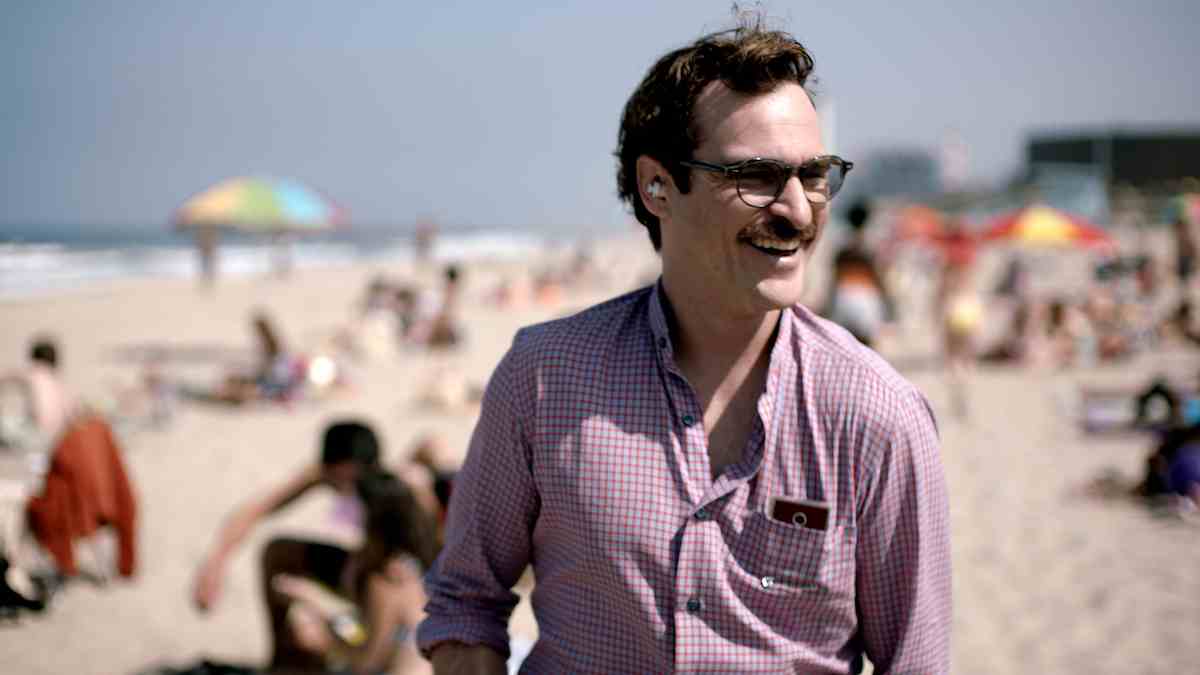I want to call “Her” a great work of science-fiction, but I can already hear my hero Harlan Ellison screaming his disapproval all the way from the opposite coast. Ellison, the famously combative and prolific author of 70+ collections of short stories, persistently objects whenever he’s called a “science-fiction” or “sf” writer. Instead, he prefers the term “speculative fiction,” a phrase that avoids generic associations with spaceships, robots, and/or laser guns. A good work of science-fiction is, in other words, only as good as its ideas. Science-fiction is a genre of possibilities, and “Her” is a prime example of that.
In this melancholic, and hopeful romantic-comedy, writer/director Spike Jonze (“Being John Malkovich,” “Where the Wild Things Are“) tells the story of a lonely man who falls in love with his computer. “Her” is not however a drippy “Electric Dreams” knockoff, but rather a warm and intelligent consideration of our continually evolving relationship with technology. Here, technology isn’t a dead-end to inter-personal interaction, but
rather an inevitable step to parts unknown. The film’s sad Utopian future is, in that sense, uncertain, but full of potential. It’s a future grounded in hopes for what might be, instead of what shouldn’t be. But yes, it’s also a moving story about a man who falls in love with a computer.
That’s the biggest hurdle in talking about “Her”: getting past the inherent twee-ness of its central premise. Joaquin Phoenix plays Theodore Twombly, a depressed bachelor. Theodore’s in the middle of a painful divorce, and is not yet used to the idea of being separated from his ex Catherine (Rooney Mara). But that transition from one emotional state to another is a good sign of the life Theodore lives in the film’s near-future version of Los Angeles. Theodore’s job is comically strange, though he does it very well: he writes intimate letters for and as other people. He’s paid to pose as a specific loved one. So Theodore dictates poetic, comforting letters that are then sent to grandchildren, spouses, parents, etc. By writing these letters, he provides total strangers with a real sense of comfort.
So it’s not that hard to imagine that Theodore could fall in love with Samantha (voiced by Scarlett Johansson), his computer’s new thinking, feeling operating system. The film’s world is based on ideas that initially seem absurd. But Jonze acknowledges that absurdity, and builds a wholly believable relationship between Phoenix, and a protagonist we never see. Samantha is not a quirky projection, or an unbelievable figment of Theodore’s imagination. She’s tirelessly inquisitive, and never not positive, and the bond she forms with Theodore is instantaneous, and believable. The fact that Samantha was designed to cater to Theodore’s needs does matter, in other words. The couple’s bond is strong, but as it strengthens, it becomes clear that Theodore can’t help but feel delusional for having invested so much affection, and attention on a
relationship with an ersatz lover.
“Her” doesn’t just blithely assume that love should conquer all. Instead, Jonze’s drama asks, without shaming Theodore, what kind of compromises a couple needs to make to be able to stay together. Samantha’s feelings are, in Catherine’s words, an “affectation,” but that doesn’t mean that they’re immaterial. As Samantha, Johansson proves that she’s as good an actress as she is a physical presence. Her voice paints a picture of a woman that’s fragile but not brittle, and optimistic but not naive. In fact, Johansson’s performance is so good that she single-handedly makes you believe in the film’s biggest idea: it’s possible to make human connections through artificial means. There are huge emotional stakes to Samantha and Theodore’s romance, and they’re not at all contrived.
The future in “Her” is defined by a rich emotional palette. Theodore’s LA is defined by a crystalline skyline, broad elevated walkways, and the warmth of the morning sun through a subway window. His urban home’s beauty does not detract, or even necessarily compete with the natural beauty of snow drifts in the woods, or a gentle wave at the beach. There’s no progression from city to country and back again, because that implies that change is either strictly good or simply bad. Instead, change in “Her” is simultaneously exciting, and scary. Or, to paraphrase Samantha’s description of how she learns from her experiences, the film’s vision of the future is not defined by progress, but by evolution. “Her” is the best kind of science-fiction, the kind that’s not defined by generic tropes, but the ability to push you outside the
realm of previously-established possibilities.












